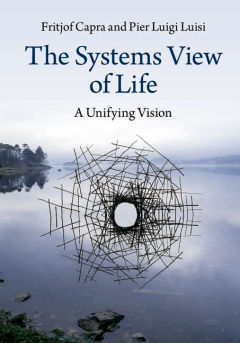'With nature as our mentor, another world is possible' David Towell reviews The Systems View of Life.
Authors: Fritjof Capra and Pier Luigi Luisi
Reviewed by: David Towell
The core mission of the Centre for Inclusive Futures is defined as 'developing sustainable communities which include everyone as equal citizens': in short, advancing ecological sustainability and human dignity. Drawing on recent developments in a wide range of scientific disciplines, this illuminating text offers a radical and coherent framework for addressing this great challenge.

Capra and Luisi, both eminent scientists in their own fields with a strong commitment to interdisciplinary studies, pursue three ambitious and inter-related aims. First, they provide a succinct overview of emerging ideas, principally in biology, psychology, sociology and ecology, which inform our understanding of life in its many forms. Second, they integrate many of these ideas into a unifying vision, 'The Systems View of Life'. Third, they explore the implications of this new perspective for our efforts to find sustainable solutions to the major interconnected problems of our times, especially the global crises in economy and ecology.
Let's start with the science. I studied Natural Sciences at University and was introduced to the ways in which first relativity and then quantum theory had transformed the scientific world view from the order and clarity we associate most with Newton. Of particular interest here is the work of Heisenberg who helped us understand the uncertainties arising from the wave/particle duality we see at the atomic level and introduced us to the radical idea of epistemic science i.e. an acceptance that what we see is not just an 'objective' feature of nature but depends on how we are looking!
In the last 30 years or more, there have been equally radical transformations in many disciplines among which we may briefly mention seven:
These ideas are developed in detail through 450 pages and illustrated with many examples, from the mathematically generated fractals of the Mandelbrot set to the elegant spirals which characterise the seed heads in a sunflower, conveying a deep sense of the beauty and harmony of the natural world.
Perhaps few of us will fully follow all the science but Capra and Luisi draw all this together to show clearly how modern science has transformed our understanding. They distinguish between the previous mechanistic view, dating from the scientific revolution of the 16th and 17th Centuries (and still visible, for example in medicine and economics) in which nature is regarded as a perfect machine, governed by exact laws of cause and effect, and where we can understand the whole by reference to its parts. This world view has been, and continues to be associated with the illusion that mankind is the master of nature rather than an intrinsic part of it. This view is not only unfounded but dangerous given our technological capacity for destruction, whether through nuclear war or climate change.
They argue instead for a radical shift in perspective to the systems view of life which integrates across both disciplines (exploring the biological, cognitive, social and ecological dimensions of nature) and levels of activity (from the most simple living cells up to the planet as a whole). In this new world view, the perspective is shifted from the parts to the whole: throughout the living world we find systems nesting within larger systems and what we call a 'part' is just a pattern in an inseparable network of relationships. Moreover all living systems share common properties and principles of organisation. Thus in thinking holistically we need to focus not on 'objects' but on relationships, patterns and contexts. Here the new science converges with the wisdom of various spiritual traditions, especially Buddhism, and is grounded in a philosophy which acknowledges the inherent value of all life.
One obvious implication is that our survival depends on political, business and civil society leaders demonstrating 'eco-literacy' and therefore that education in the wisdom of nature should be central to the curriculum (both what we learn and how we learn it) for all of us, with a strong focus on experiential learning (for example, through developing and studying the school garden).
The most important application of the systems view of life is in addressing the global economic and ecological crises of our Century, systemic problems par excellence. The current version of global capitalism is driven by an eco-illiterate belief in unlimited growth on a finite planet, corporate domination and casino finance. We see the ecological impacts in resource depletion, environmental degradation and irreversible climate change as well as massive and growing inequalities between a small elite ('the 1%') and the rest of us.
Instead we need to create a new economic system which is both ecologically sustainable and socially just. As participants in this system we need to find satisfaction not in excessive material consumption but rather in human relationships, community and enjoyment of nature.
Capra and Luigi identify key elements in these systemic solutions: reshaping the economic system and its regulating institutions; developing alternative energy strategies, for example based on wind power and hydrogen fuel cells; generating the food we need through a renaissance in organic farming; and designing our living arrangements in tune with the flows of the natural world as we already see in eco-cities with their car free city centres, re-emphasis on walking and cycling, green spaces and enhanced opportunities for building community.
With nature as our mentor, another world is possible.
The publisher is Cambridge University Press.
The Systems View of Life © Fritjof Capra and Pier Luigi Luisi 2014.
Review: The Systems View of Life © David Towell 2017.
All Rights Reserved. No part of this paper may be reproduced in any form without permission from the publisher except for the quotation of brief passages in reviews.